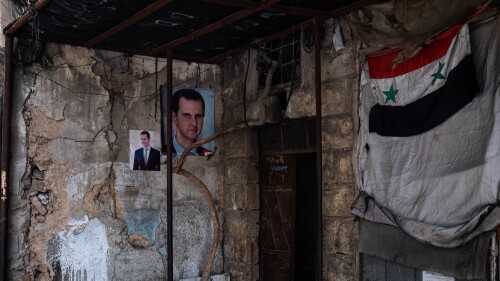Last week, I became a whistleblower. (According to Merriam-Webster, a whistleblower is someone “who reveals wrongdoing within an organization to the public or to those in positions of authority.”)
This is not a role I expected or sought, but I felt compelled to go public when the U.S. Institute of Peace, in Washington, D.C., the taxpayer-funded organization to whose board President Bush appointed me, insisted on co-hosting an event with a group closely associated with radical Islam.
That group is the Washington-based Center for the Study of Islam and Democracy; the event was a workshop that took place — over my strenuous objections — on March 19.
Most of CSID’s Muslim personnel are radicals. I brought one such person in particular, Kamran Bokhari, to the attention of USIP’s leadership. Mr. Bokhari is a fellow at CSID; as such, he is someone CSID’s board of directors deems an expert “with high integrity and a good reputation.” As a fellow, Mr. Bokhari may participate in the election of CSID’s board of directors. He is, in short, integral to the CSID.
Mr. Bokhari also happens to have served for years as the North American spokesman for Al-Muhajiroun, perhaps the most extreme Islamist group operating in the West. For example, it celebrated the first anniversary of 9/11 with a conference titled,” Towering Day in History.” It celebrated the second anniversary by hailing “The Magnificent 19.” Its Web site currently features a picture of the U.S. Capitol building exploding. (If the site changes, an archived copy is available.)
Nor is Al-Muhajiroun’s evil restricted to words and pictures. Its London-based leader, Omar bin Bakri Muhammad, has acknowledged recruiting jihadists to fight in such hotspots as Kashmir, Afghanistan, and Chechnya. At least one Al-Muhajiroun member went to Israel to engage in suicide terrorism. Al-Muhajiroun appears to be connected to one of the 9/11 hijackers, Hani Hanjour.
USIP’s indirect association with Al-Muhajiroun has many pernicious consequences. Perhaps the most consequential of these is the legitimacy USIP inadvertently confers on Mr. Bokhari and CSID, permitting radicals to pass themselves off as moderates.
That legitimation follows an assumption that USIP carefully vetted CSID before working with it. But USIP did nothing of the sort.
When its leadership insisted on working with CSID, it explained its reasons: “The CSID is assessed by relevant government organizations and credible NGOs supported by the Administration to be an appropriate organization for involvement in publicly funded projects organized by both the government and NGOs, including the Institute.”
Translated from bureaucratese, this says: “Others have worked with CSID, so why not us?”
But such buck-passing means that in fact no one does due diligence — each organization relies on those that came before. Once in the door, a disreputable organization like CSID acquires a mainstream aura.
Or it does until its true identity becomes clear. Over and over again, branches of the American government have been embarrassed by their blindness to jihadist Islam.
- Ask the presidential candidate who had himself photographed smiling side-by-side with an Islamist who soon after was imprisoned for terrorist activities.
- Ask the U.S. military, which has arrested or convicted at least seven Islamists for criminal activity connected to jihad.
- Ask the New York State prison system, which recently awoke up to the fact that one of its chaplains announced that God had inflicted 9/11 as punishment on the wicked — and the victims got what they deserved.
- Ask the mayor of Boston who had city land sold to the Islamic Society of Boston for less than 10% of market value, only to learn later that the organization is closely associated with one jihadi extremist banned from entering America, another sitting in federal prison, and a third who welcomes suicide bombings against Israelis as “glad tidings.”
In all these cases, no one was minding the store. The lesson is simple but burdensome: each governmental institution must do its own research.
In the war on terror, it is not enough to deploy the police and the military; it is just as necessary to recognize and reject those who develop the ideas that eventually lead to violence. The American government needs to wake up to those elements in its midst whose allegiance in the war on terror is on the other side.






